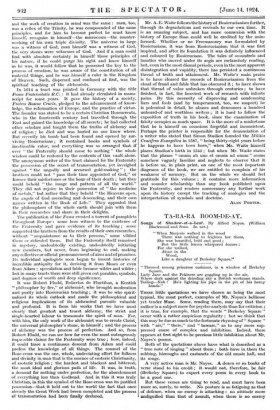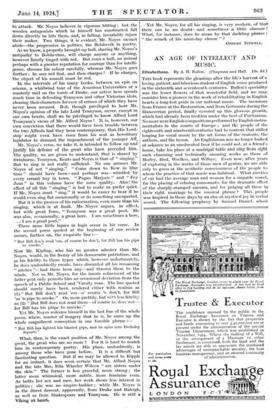TA-RA-RA BOOM-DE-AY.
Songs of Shadow-of-a-Leaf. By Alfred Noyes. (William Blackwood and Sons. 5s. net.)
"When Marjorie walked in the wood There was nothing to frighten her there.
She was beautiful, bold and good ; But the little leaves whispered beware ; For she walked, Alone in the Wood, Like a daughter of Berkeley Square."
"Throned among primrose cushions, in a window of Berkeley Square,
Lady Jane and the Pekinese are goggling up in the air,
Where dark against the drizzling ,sky a British workman stands. Toiling—Nah ! He's lighting his pipe in the pit of his horny hands."
Timan little quotations we have chosen as being the most typical, the most perfect, .examples of Mr. Noyes's bellicose
yet tender Muse. Some, reading them, may -say -that their author is a subject more for psycho-analysis than for criticism ;
it is true, for example, that the words "Berkeley Square" occur with a rather suspicious regularity ; but we think that this may be due as much to the fortunate rhyming of" Square" with "air," "there," and beware," as to any more sup- pressed cause of complex and inhibition. _Indeed, there appears at first sight. to be precious little inhibition about Mr.
Noyes's poems.
Both of the quotations above have what is described as a "true note of singing" about them ; both have in them the sobbing, hiocoughs and castanets of the old music hall, and its songs.
A very active man is Mr. Noyes. A dozen or so books of verse stand to his credit ; it would not, therefore, be fair (Berkeley Square) to expect every poem in every book to be a good one.
But these verses are tiring to read, and must have been more so, surely, to write. No posture is so fatiguing as that of defence, when no enemy is attacking-; no attitude more undignified than that of assault, when there is no enemy
tti attack. Mr. Noyes believes in vigorous hitting ; but the wooden antagonists which he himself has constructed fall down directly he hits them, and, in falling, invariably injure their maker. Two things, it is evident, Mr. Noyes cannot abide—the progressive in politics, the Bolshevik in poetry.
As we know, a properly brought-up bull, sharing Mr. Noyes's antipathy to Bolshevism, will charge anyone or anything, however faintly tinged with red. But even a bull, an animal perhaps with a greater reputation for courage than for intelli- gence, chooses his colour carefully, whereas Mr. Noyes goes further : he sees red first, and then charges ! If he charges, the object of his assault must be red.
In the intervals of his many books, between an epic on 'science, a whirlwind tour of the American Universities or a masterly raid on the tomb of Drake, our active hero spends much time in defending Tennyson and other Victorian idols, 'clearing their characters for ever of crimes of which they have ,never been accused. But, though privileged to hear Mr. Noyes's opinion of the late Lord Tennyson, never, except in our own hearts, shall we be privileged to know Alfred Lord Tennyson's views of Mr. Alfred Noyes ! It is, however, our own conviction that there would have been trouble between the two Alfreds had they been contemporary, that His Lord- ship might even have risen from his seat as hereditary legislator to demand the impeachment of the younger Alf.
Mr. Noyes's verse, we take it, is intended to follow up and justify his defence of the great who have preceded him. The quality, we are given to understand, that is shared by Swinburne, Tennyson, Keats and Noyes is that of "singing." But to sing is not really sufficient. No one accuses Mr. Noyes of not "singing." "Come down to Kew in lilac time" should have been—and perhaps was—whistled by every errand boy in town. "Pagan Marjorie" and "Fey Joan" in this volume have the same quality. Alas ! the effect of all this " singing " is but to make us prefer quiet. If Mr. Noyes must "sing," it would be easier to bear if he would even sing flat occasionally or do something unexpected.
But it is the process of his ratiocination, even more than his singing, which is at fault. Mr. Noyes argues, in effect, but with great force, "Tennyson was a great poet. He was also, occasionally, a great bore. I am sometimes a bore, • . . I am a great poet."
These same little lapses in logic occur in his verse. In the second poem quoted at the beginning of our review occurs, further on, the exquisite line :-
" But Bill don't read 'em, of course he don't, for Bill has his pipe to smoke."
Now Mr. Kipling, who has no greater admirer than Mr. Noyes, would, in the frenzy of his democratic patriotism, and in his fidelity to those types which, however unfortunately, he does undoubtedly create, have discarded all his remaining aitches "—had there been any—and thrown them to the winds. Not so Mr. Noyes, for the innate refinement of the latter gent only permits him an occasional deviation from the speech of a Public School and 'Varsity man. The line quoted should surely have been rendered either with realism as (1) "But Bill don't read 'em—o' course 'e don't, for Bill 'as 'is pipe to smoke." Or, more prettily, but with less fidelity as (2) "But Bill does not read them—of course he does not— for Bill has his paipe to smOcke."
Yet Mr. Noyes redeems himself in the last line of the whole poem, where, master of imagery that he is, he sums up the whole magnificent conception in one forcible phrase :—
" But Bill has lighted his blasted pipe, and he spits into Berkeley Square."
What, then, is the exact position of Mr. Noyes among the great, the great who are no more ? For it is hard to match him in contemporary poetry. His place, undoubtedly, is among those who have gone before. It is a difficult but fascinating question. But if we may be allowed to Kipple for an instant, it does seem certain that Mr. Alfred Noyes and the late Mrs. Ella Wheeler Wilcox "are sisters under the skin." The former is less graceful, more strong ; the latter more whimsical, more subtle, more feminine even. As befits her sex and race, her work shows less interest in politics ; she was no empire-builder ; while Mr. Noyes is in the direct descent, apparently, from Drake and Raleigh, as well as from Shakespeare and Tennyson,- He is still a !Ming at heart.
Yet Mr. Noyes; for all his singing, is very modern, of that there can be no doubt—and sometimes a little obscure ! What, for instance, does he mean by that darkling phrase : "the smack of his noon-day cheese " ?
OSBERT SrTWELL.











































 Previous page
Previous page